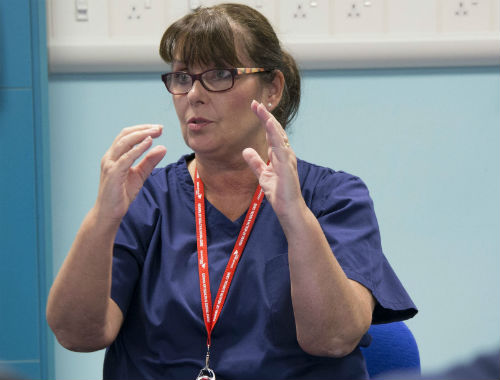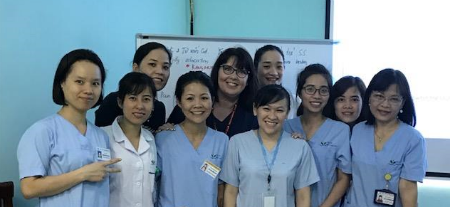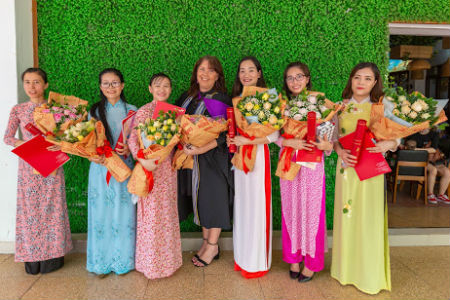It is by any measure the most dangerous time in our lives.

The first 28 days after we are born, the neonatal period, marks the hazardous transition from fetal life to the air-breathing world outside the uterus.
Bodily systems have to adapt to functioning independently and supporting us through infancy, childhood and adult life.
UNICEF and the World Health Organisation suggest this period of time, when babies are at their most vulnerable, is when they face the greatest risk of dying. The average rate of deaths is said to be one in the first month for every thousand live births.
To give newborns the best possible chance, it is essential that they are cared for by well-trained skilled nurses, and Scottish educational expertise is playing a key role in this on the other side of the world.
Edinburgh Napier, Scotland’s only university to produce graduates in the four fields of nursing (adult, child health, learning disabilities and mental health) and midwifery, has developed a bespoke neonatal nurse education programme now being delivered at one of Vietnam’s largest hospitals.

The intensive 16-week course at the National Children’s Hospital in capital Hanoi has just seen the first pilot group of eight nurses successfully graduate, and a second cohort have now begun their training.
It has been heart-warming to see the enthusiasm with which the students have embraced the training programme, which combines theory and skill competency in a modern digital teaching environment.
Globally, 2.5 million children died in the neonatal period in 2017 alone. If this trend continues, UNICEF and WHO predict we face a further 27 million neonatal period deaths between 2018 and 2030.
Prematurity - babies born before 37 completed weeks of pregnancy - is, worldwide, a high ranking cause of death in this transitional period. Infection, complications of labour and birth and congenital anomalies are also significant factors.
Prompt recognition and treatment of illness in the neonate requires a highly specialised medical and nursing workforce. In the UK, we have specialist post graduate training for both doctors and nurses who choose to work in this area of healthcare.
However, medical and nursing education on how to prepare and provide the best environment for sick new born babies can be very difficult in resource poor, or developing countries.
Vietnam has recognised the need for specialist services in this area. The country is undergoing rapid improvement in nursing and medical education provision, particularly in neonatology.
The use of technology, and support from the Ministry of Health for nurses to improve on their education and qualifications, has given rise to a rapidly growing group of specialist neonatal nurses.

The neonatal department at the Vietnam National Children’s Hospital in Hanoi, where the new programme is being delivered by a team of specialist staff from Edinburgh Napier, provides treatment for up to 300 sick and convalescing babies at any one time.
The course is funded by UK-registered charity Newborns Vietnam, which works tirelessly to fundraise, mainly through sporting events, in an effort to reduce neonatal mortality in the country.
The 16-week training programme is delivered in English and translated by medical staff to the student nurses, the first time Edinburgh Napier has delivered education in this dual language format. There is even a virtual learning environment or online classroom to support face-to-face teaching.
The nurses work in very difficult, understaffed conditions but turn up to class bursting with enthusiasm and eager to learn. They feel very privileged to be allowed this education opportunity, and are a complete joy to teach.
Integrating the family into assisting with care of their sick babies is a priority for medical and nursing staff in the UK, but this concept was initially viewed with a certain amount of distrust.
Not only did parents not help with care of their babies in intensive care in Hanoi, they were not allowed to visit their baby due to concern about introducing infection to already very compromised babies.
Slowly, with constant education and positive reinforcement, the nurses came to realise the importance of parents in the neonatal unit and, in particular, allowed mothers to have skin to skin contact with their baby, allowing for deeper bonding and attachment, as well as physiological stability.
There was great excitement when, five weeks into the course, the first mother was allowed to do ‘kangaroo care’ with her baby in the intensive care area. Two days later, four mothers were contentedly providing kangaroo care, and the numbers are growing daily.
The nurses are finding their voice and have become excellent advocates for the babies in their care. They say this course has given them not only knowledge and deeper understanding, but also the confidence to speak up in the best interest of the babies and their families.
In a very short time, these nurses have flourished through education, and it was a very proud moment to see them walk across the stage at July's graduation ceremony.
Anne Moylan is a lecturer in Edinburgh Napier University’s School of Health & Social Care. The article first appeared in The Scotsman.